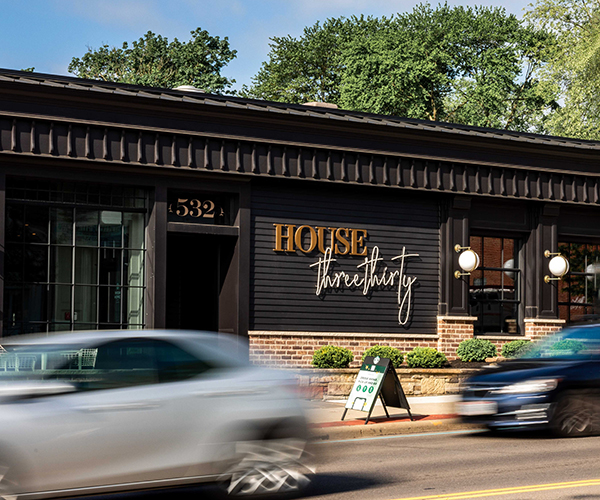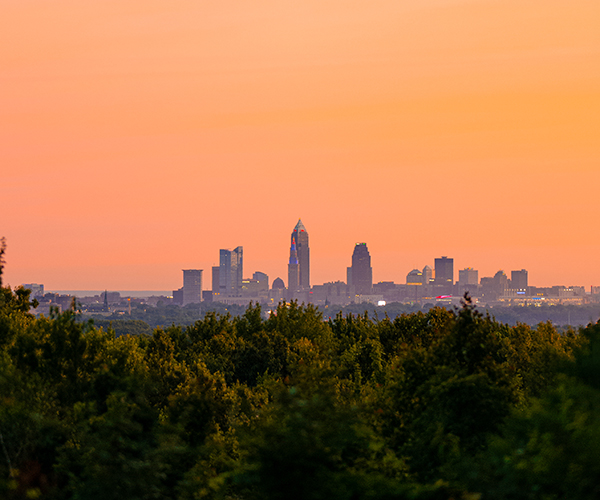"There's something sensual about it, something spiritual," says the coffee bean roaster and 1976 founder of the first Arabica cafe. Jones reflects back to 1985 when, bankrupt, he was forced to sell his Arabica chain (which then included the Coventry, Shaker and Old Arcade cafes), as well as his house and most of his belongings. In the depths of depression, Jones drove himself to a Canton campground and lived in a tent for three months. "I had 5 pounds of ground coffee," he remembers, "a one-cup coffee maker, an espresso pot and enough money to buy crackers and peanut butter."
In the fall of •86, a friend gave the homeless businessman a 100-year-old coffee roaster; another loaned him some tables and chairs. Jones opened a tiny Kirtland roastery, saved some money and in •89 moved his operation into a small space behind the Coventry Arabica. For a year and a half, his Phoenix Coffee Company quietly sold beans to Arabica, the chain that had been his brainchild. Until last July.
Today, Jones talks about the verbal skirmish thundering through Greater Cleveland's cafe community. Selling coffee, it turns out, is a particularly squabble-filled and politically charged business. Although by all accounts (including his own) Jones seems to be the focus of all the fuss, the entrepreneur claims he's an unwilling participant. He just wants to roast coffee.
Cleveland's coffee patriarch sits in Phoenix's headquarters — a curious storefront roastery next to a Napa Auto Parts store on Mayfield Road in Cleveland Heights — and looks bewildered when he's told that two of Arabica's co-owners, David Reich and Marvin Schwartz, had nothing but complimentary things to say about their former supplier, the man from whom they purchased their empire.
"They hate me," Jones says with wide-eyed incredulity. "I know that for a fact. They won't do business with me; they won't even talk to me. When I started in this business in the •70s, everybody was really nice and helped each other. If I'd have known it would be like this, I probably wouldn't have sold it to them back then." The business relationship soured, Jones recalls, over a few minor misunderstandings that ballooned out of proportion. The escalation hints at the cloud of paranoia that seems to hover over Cleveland's coffee movers and shakers.
In September 1991, the catastrophic Coventry fire destroyed Jones's small shop, so he moved his roastery to the Mayfield Road location and began planning his return to the coffeehouse business. But Phoenix continued to supply beans to its major client, Arabica. A non-compete agreement was reached stating that if Arabica were to buy Phoenix beans, then Jones couldn't open within two miles of a suburban Arabica or 3,000 feet from a downtown operation.
A month later Jones opened a Phoenix Cafe near the intersection of Detroit Avenue and Warren Road in Lakewood — believing it was several miles away from the nearest Arabica in downtown Cleveland. Jones says he was unaware that Arabica was negotiating a lease with Lakewood's City Center, the new 70,000-square-foot, $5.6 million retail complex. When the Lakewood Arabica opens this month, its patrons can practically gaze across the street into the competition's windows. That's a big deal in an industry where location and foot traffic play major roles.
"I don't know where this sense of paranoia and competition comes from," Jones says, describing his shock when Arabica "mysteriously" stopped buying his beans. But last December (now that the non-compete deal was off) he opened a Phoenix in downtown's Illuminating Building — in taunting proximity to the Arabicas in the Colonial Arcade and Citizens Building.
As if the game were just getting fun, now Jones plans to open six more cafes in the next two years. He also says, "it's a distinct possibility" that his next Phoenix Cafe will open mid-summer in — of all places — Coventry. Of course that's if and when a contractor builds something in the shopping strip's fire-ravaged hole.
The proposed Phoenix will sit little more than two bus lengths from its competition. No problem, says Jones. "There's as much room for cafes in this town as there's room for bars."
A 1992 industry profile, "Specialty Coffeehouses/Cafes in Northeast Ohio" by graduate students at Cleveland State University, reports that 28 freestanding coffeehouses are sprinkled around Greater Cleveland, and it anticipates that more cafes will open in the outer suburbs of North Olmsted, Westlake, Solon and Hudson. The CSU study also notes that retail coffee sales (at $6.7 billion) have barely budged in five years, while gourmet coffee sales grew an average of 10 percent annually; in 1991, gourmet beans were a $780 million industry.
Coffeehouses are the "frozen yogurt of the •90s," the researchers say, and their current growth will "likely flatten out" as the market "reaches a saturation point." But they also predict that "unlike a fad ... coffee drinkers will not want to go back to drinking bad coffee once they have learned to distinguish the good from the bad." Coffeehouses may come and go, but gourmet coffee is here to stay.
Almost half of America's adults drink coffee. And although the National Coffee Association saw individual consumption fall from 3.1 cups a day in 1962 to 1.75 in 1991, the notion of a 50- to 80-percent product markup continues to lure local entrepreneurs into the coffeehouse business. The competition is fierce.
"According to the roasters we talk to, 16 new coffeehouses opened up in 1991," says Arabica's Schwartz. "I predict that 50 percent of them will be gone in two years. People think it's easy. It's not."
For starters, preparing a cup of gourmet or specially brewed coffee is labor-intensive. An employee must hand-brew most specialty drinks, and it can take one to two minutes to whip up a cafe mocha, brew an espresso or steam a caffe latte.
Customer turnover (often a make-or-break factor in the food-service business) is snail slow. After all, a good part of the coffeehouse allure is knowing you can settle in with your newspaper, book or friend and amuse yourself for hours.
And start-up costs (as in any restaurant business) are burdensome at best, with brewers starting at $2,000, espresso machines an easy $5,000 and cake cases running $7,000. The CSU study suggests $200,000, minimum, just to open the doors. That's a lot of money when you're selling $2 tickets.
"That's what most of the competition's finding out," says Arabica's David Reich. "They watch us, they open up. And they find at $3 an average sale, it takes a tremendous volume of customers to be successful."
No one's getting rich, but most coffeehouses we visited were solvent or getting there. The key seems to be finding a niche. Cafes attached to bookstores, for example, are inherently secure. Reading and coffee drinking are natural neighbors, although one can only speculate which industry supports which.
And business is fine for Cravings, the specialty foods and coffee stores in Tremont and Rocky River. "Yes, there's room for everyone," says owner Bob Holcepl. "But if you're making 75 cents on the dollar, you have to sell thousands of dollars to make it in this business. That's the problem with people who get into the business to make a fast buck."
In November of last year, Coffees of the World opened its first cafe at the Cedar-Fairmount intersection in Cleveland Heights after seeing the success of their two walk-up mall stores. And while they admit that business is slow (manager King Milling sighs when you mention the Coventry Arabica sitting a few blocks away), owner Joanne Green hopes inviting perks, such as local art exhibitions and weekend jazz shows, will change local passers-by into loyal patrons.
"If it isn't within a six-block area, I don't consider it competition," says Jim Jensen, owner of downtown's Brewed Awakenings. At the Prospect Avenue cafe, an "Andy Warhol meets Ma Kettle" ambience is the draw, as are live music, open-mike nights and alternative art events. Jensen caters meetings and parties to fill in revenue gaps.
Howard Sobel wants his new Coffee Adagio in Shaker Heights to function more as a specialty coffee store than a destination spot for poetry-reading gatherers. Sobel sells to the coffee connoisseur and views on-premises roasting of specialty coffee beans as the wave of the future. "Coffeehouses are interested in mass production and mass sales," Sobel explains. "So they buy coffee that's less expensive and mass produced, coffee that sits around a distributor or a store for weeks and weeks. There's a strong, sophisticated coffee consumer contingency in Cleveland; in the future, they'll demand the quality they're getting used to."
But for most folks, convenience is everything. "Six thousand people pass by here every day," says Sylvia Nogalo of her Perfect Cup cafe in Reserve Square (she and co-owner Ingrid Medancic actually counted before signing the lease). "I know I get 10 percent of them." The women are pleased with business in their first couple of months but emphasize that they're the only employees and 80-hour weeks are standard. "Competition?" says Nogalo. "None. A cafe could open next door and it wouldn't affect business."
"My competition isn't even in town," says Carl Jones dismissively. "My main concern is to keep Starbucks out," he says of the Seattle-based franchising behemoth. "But they probably wouldn't try to open up in Cleveland because there's already a well-organized coffee presence here."
And that's a presence for which Carl Jones is ultimately responsible. Everything returns, he says reflectively, to an odd quote by Russian philosopher I'D. Ouspensky: "If you can make a good cup of coffee, you can do anything well."
"I started Arabica because I wanted to find out what that meant," he says. "It turned out to mean a hell of a lot."



